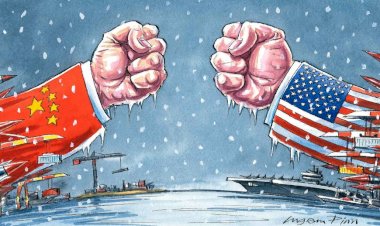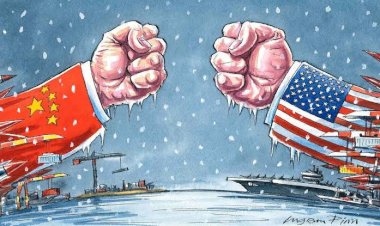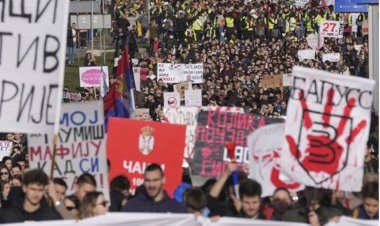IS FASCISM COMING TO EUROPE: A Theoretical Approach to Far Right - V. U. ARSLAN

The Immigration Issue and Fascism Debate
Far-right parties are on the rise in European elections. The European Parliament elections on June 7 were a continent-wide manifestation of this trend. Lately, in the first round of early elections held in France last Sunday, the far-right National Rally (RN) came in first, receiving 33% of the votes. There are many who interpret the successes achieved by far-right parties as the footsteps of fascism. So, what is the real situation? Are the Western democracies really falling into the clutch of fascism or are far right parties being integrated into the system and reaching a temper which they can be entrusted with power?
The Deceiving Charm of Far Right and Missed Opportunity of the Left
In Europe, social democratic, liberal, conservative, environmentalist, etc. parties, which are not much different from each other, come to power one by one. While these parties are in power, they implement the same bourgeois program with minor differences. However, due to the neoliberal programs implemented in Europe for many years, the living standards of the lower classes have gradually declined from generation to generation. Because of this economic decline, ruling parties quickly fall out of favor and are usually replaced by another mainstream bourgeois party in the next election. The new holders of power would continue the same policies, more or less. For example, if the revival of German militarism was the necessity as a historical rupture due to the Ukrainian War, the ruling Social Democrat (SPD)-Greens coalition did not hesitate for a moment to do what is necessary. The fact that a party whose alleged reason for existence is anti-militarism is a champion of militarism and imperialist aggression should tell us a lot.
Let’s give another example from Britain. Britain, the epitome of stability, is increasingly losing its famous stability due to economic stagnation. The Conservative Party suffered a historic defeat in the elections held on Thursday, but the Labour Party that replaced it will pursue the same policies. This parliamentary stupidity is running out on the continent. Far-right parties that present themselves as different, anti-system, “anti-elite” are on the rise. In one way or another, anti-system energy forms the dynamics of the far right.
So why isn’t the anti-system energy directed to the left while the working class is losing so many of its rights? In fact, it was. In the economic crisis that shook Greece and Spain in the 2010s, self proclaimed radical left-wing parties Syriza and Podemos managed to come to power with high votes. These two movements made a big impact at the time. But their experience in power has shown that these parties are not anti-system at all. By implementing social cut packages both Syriza and Podemos have shown that they are in fact no different from mainstream social democratic parties. The same should be said for Die Linke, which came to power in the eastern German states. This so-called radical left party which approved privatizations has now reached the end of the road with crises and divisions. Similar examples occurred in Portugal, Denmark and Britain (Corbyn). In short, the masses turned to left-wing alternatives that presented themselves as anti-establishment, but the parties they turned to were not much more radical than the social democrats and worked for the rulers of the system in times of crisis. As such, they were tested and fallen out of favor. Unfortunately, the revolutionary left was too weak to be an alternative and could not fill the gap and take on a leading role.
Far Right Integrates to the System: Meloni Case
Far-right parties present themselves as an anti-establishment force and exploit the immigration issue to the fullest. But are far-right parties radical enough to shake the established political and social structures in Europe? Or, in other words, how different will these parties be from other mainstream bourgeois parties in their potential government? There are three main issues that can be considered as indicators at this point:
1) Neoliberal economic model
2) Attitude in the Ukraine War and commitment to NATO
3) Immigrant issue
In order to understand what the electoral success of far-right parties actually corresponds to; we need to examine the power practices of these parties on these three issues. In other words, is the classical bourgeois program presented in a different package; or are we watching the march to power of fascism, which has a sharp program and practice that is preparing to eliminate bourgeois democracy?
Perhaps the most obvious example to give to understand what the electoral success of far-right parties really amounts to is Italian Prime Minister Georgia Meloni.
“Yes, to the natural family. No to the LGBT lobby, yes to sexual identity. No to gender ideology. No to Islamist violence, yes to secure borders. No to mass migration, no to big international finance, no to bureaucrats of Brussels.” (BBC, September 2022)
Meloni was thundering on the podium with these words 2 years ago and increasing her votes to record levels. In fact, she won the elections and became prime minister. So, what did Meloni do about these issues she was ranting about in her 2 years in power? Of course, the phrase “no to international finance” was a big lie. She did not do anything that contradicted the major international financial circles. The European far right is known as Eurosceptic, and Meloni was ranting about Brussels bureaucrats in her speeches. However, nowadays, the ringleader of Brussels bureaucrats, Ursula von der Leyen, is Meloni’s close friend and Meloni does not refrain from supporting Leyen. Leyen and other mainstream conservative party leaders are calling on Meloni to join the center-right conservative group (EPP) in the European Parliament. If this happens, it will be the final straw for Meloni and her party’s integration into the system. Meloni used to be close to Putin, but after the Ukraine war, she made a major U-turn and became one of NATO’s most fiery spokespeople. The natural family and the issue of LGBT are nothing more than rhetoric used to appeal to conservative voters in a Catholic country. As to the north, the European far-right’s emphasis on family and anti-LGBTI sentiment fades even more. Now let’s come to anti-immigration and anti-Islamism. This is the most crucial part because this is the main issue that far-right agrees on and gains voter support everywhere. So how did Meloni’s immigration policy take shape in the two years she was in power?
There has been a sharp increase in irregular immigration during Meloni’s time in office. She recently made another dramatic U-turn by introducing legislation that would allow up to 1.5 million new immigrants to come legally. (Politico, August 2023, How Italy’s Far-right Leader Learned to Stop Worrying and Love Migration) With Italy’s declining population and its economy still reeling from stagnation, what could Meloni do? Italy’s population is rapidly aging, and in many parts of the country, the number of retirees has surpassed the number of employed people. Meloni has also had to adapt to the established order of capitalist Europe regarding immigration. Meloni’s July 2023 decree on legal immigration states that Italy needs 833,000 new immigrants over the next three years to fill a huge gap in the labor market. The decree calls for opening the country’s doors to 452,000 immigrant workers over the same period to fill seasonal jobs in sectors such as agriculture and tourism, as well as long-term positions such as plumbers, electricians, maintenance workers and mechanics. Mainstream journalists praise Meloni’s realistic stance.
Immigrants and the Immigration Policy of Europe’s Capitalist Establishment
The European establishment's view on immigration can be summarized as follows:
- The birthrate in Europe is falling, the local population is in decline and aging. As the number of retirees increases, the burden of social security is becoming more and more difficult for the ruling classes. European capitalism needs a strong labourforce flow in order not to lose its economic altitude any further. While there is a large labourforce deficit in unpopular areas, there is an urgent need for qualified labourforce in almost every sector. This necessitates a systematic migration inflow.
- European capitalism has access to cheap labour thanks to immigrants. By stealing the skilled labor that underdeveloped countries have trained with their limited resources, European capitalism is displaying another aspect of imperialism.
- European capitalism wants immigration to be as controlled as possible. Sudden waves of immigration and millions of immigrants arriving at the gates of Europe are not wanted because they would not only be economically non-beneficial but also create social and political tensions. Therefore, the impression of an open-door policy is not allowed. Keeping the borders tight and the toughening integration policy are related to keeping the flow of immigrants at a controlled and “qualified” level.
- European capitalism uses anti-immigrant sentiment to divide the working class and to suppress class consciousness and struggle. Anti-immigrant far-right parties present immigrants as scapegoats for the problems created by the system, and in doing so, they provide another service to the system.
Far Right in Moderation and the Example of Le Pen
The future of the capitalist system depends on the flow of migrants. That is why the rhetoric of far-right politicians in opposition will remain empty words. As in the case of Meloni, when Le Pen or others come to power, they have to adapt to the system, and even before they come to power, they have to guarantee this to the ruling class. Just like Marine Le Pen, who is called a “Putin friend”, switching to the Ukrainian side. Another example is Le Pen’s expulsion of the German far-right AfD from the Identity and Democracy (ID) group in the European Parliament. Even the AfD, which is seen as the most radical of these parties, already has a strong moderate wing within it. Besides, the AfD will have to stew in the opposition ranks for many more years. It is certain that they will soften further over the years. In the meantime, it is also necessary to underline that Le Pen has put forward Jordan Bardella, a child of immigrants who grew up in the poorest suburbs of Paris and has Italian and Algerian roots, as her party’s candidate for prime minister. In this way, Le Pen managed to both gain votes from the poor immigrant suburbs where her National Rally party had previously been ineffective, and also made her party’s shift to the center visible. In the meantime, it is also necessary to state that one of the fundamental policies of European capitalism on the immigration issue is to elevate “integrated” immigrants to the top of the system.
Meloni in Italy may have a “more Christian”, “more family-oriented”, “more Italian” image in the future; she will undoubtedly continue to resort to empty right-wing rhetoric in order to maintain this image. This image makes Meloni somewhat resistant to the erosion of power and the loss of votes in terms of cultural right-wing, but that is all. In reality, Meloni has adapted to the immigration needs of European capitalism, her NATO support has been proven and she will certainly not deviate from neoliberalism. Nothing has changed in Italian political and social life with Meloni. So, what is the point of crying out that fascism is coming!
Is the Bourgeois Democratic System Under Threat?
In short, evaluating the electoral success of far-right parties as the process of fascism coming to power in Europe means being quite disconnected from reality. It is true that the political center of gravity in Europe is shifting to the right, and this is not a good. But is the rise of far-right parties preparing a fascist environment in which bourgeois democratic rights will be destroyed? Again, using the example of Italy, is there a real threat against bourgeois democratic rights?
When we look at Italy, where “fascism came to power,” there were no police attacks on Palestinian protests, while in Germany, where the SPD-Green coalition is in power, there has been state oppression against marches in support of Palestine. In all Western countries, politicians, academics and artists who declare support for Palestine are silenced with anti-Semitism witch hunts. When it comes to attacks on democratic rights, it is fresh in our memories how liberal Macron in France ordered a ruthless state terror against the class struggle raised by the Yellow Vests.
Fascism has not come to US during Trump’s presidency. Or Argentina has not fallen into the clutches of fascism because the far-right Milieu is in power. On the other hand, in Argentina, unlike Europe, serious attacks are being carried out on democratic rights, because the depth of the capitalist crisis and the resistance of the organized working class and revolutionaries make a clash inevitable but this is not the rule of fascism. Shouting out fascism at every case of police violence undermines both the understanding of fascism and the perspective of the struggle against fascism.
False analyses on fascism are causing great harm to the left and the workers’ movement. Here in France, Jean Luc Melenchon, the leader of the left wing of the New Popular Front (NFP), an alliance of various reformist left parties, announced that they would withdraw their candidates in the constituencies where his party came in third in the second round of the parliamentary elections. In other words, he called for votes for Macron’s party against the National Rally candidate in these constituencies, and with great emphasis. Thus, the Popular Front turned into the nonsense of the Republican Front. If you present the National Rally’s possible partnership in power as the coming to power of fascism and a great disaster, you are calling for votes for an enemy of the people like Macron, the number one man of the capitalists. Calling for votes for Macron, who is hated by the working people, portrays the socialists as part of the system and the National Rally as anti-system. It would be hard to find a better way to weaken the left than this. The extreme right or fascist forces are defeated by the means of class struggle. The left can only be weakened by appealing to the capitalists and their apparatus.
At this point, it would be useful to express some views on what fascism is and the conditions under which it comes to power.
Have the Structural Conditions for Fascism's Rule Formed in Europe?
If we deduce the rise of fascism to rhetorical opposition to immigration we would completely undermine the concept of fascism. The rise of fascism means the complete shelving of bourgeois democracy, the crushing of workers’ organizations and left-wing organizations, and the iron-fist discipline of the production process and social life. In order for such an extraordinary regime to come to fore, certain fundamental structural developments must occur. On this issue, we should quote Leon Trotsky, who is unmatched in his theory of fascism:
“Both theoretical analysis as well as the rich historical experience of the last quarter of a century have demonstrated with equal force that fascism is each time the final link of a specific political cycle composed of the following: the gravest crisis of capitalist society; the growth of the radicalization of the working class; the growth of sympathy toward the working class, and a yearning for change on the part of the rural and urban petty bourgeoisie; the extreme confusion of the big bourgeoisie; its cowardly and treacherous maneuvers aimed at avoiding the revolutionary climax; the exhaustion of the proletariat; growing confusion and indifference; the aggravation of the social crisis; the despair of the petty bourgeoisie, its yearning for change; the collective neurosis of the petty bourgeoisie, its readiness to believe in miracles, its readiness for violent measures; the growth of hostility towards the proletariat, which has deceived its expectations. These are the premises for a swift formation of a fascist party and its victory.” (Trotsky, FASCISM: What It Is and How To Fight It)
The material conditions for the institutionalization of fascism, the sharpest of the extraordinary regime, are not yet of question in Europe.
Economic Depression: Fascism comes to fore as a way to provide absolute labor discipline in the face of economic depression and to suppress any resistance that may develop against it. There has been an economic stagnation in Europe for a long time, but we cannot talk about an economic depression.
The Danger of Revolution: In order for the ruling class to allow a fascist regime, it must fear the organized labor movement and the looming revolution. The capitalist crisis, a strong labor movement, and the danger of revolution begin to force an extraordinary regime. The ruling class sees it necessary to completely suspend democratic rights and smash labor organizations. While military coups can often serve this purpose, the fact that the law enforcement forces of the system cannot be trusted for such a large and dangerous suppression movement makes the fascist movement a last resort. Unfortunately, there is no labor movement that threatens the ruling class in Europe today.
Petty Bourgeois Mass Movement: The paramilitary street power of fascist movements is necessary to crush the struggles that may develop in workplaces, universities and high schools, neighborhoods and streets. This is a very distinctive feature. Today, the extreme right parties in Europe either do not have such a street froces or it is very small.
There are no conditions for fascism to dominate Europe. It is not possible to talk about the ruling class losing control. Unfortunately, we cannot talk about the danger of a class movement and revolution that threatens capitalist power either. The far-right parties we are talking about are not parties that use mass street power to terrorize workers' organizations, minorities and revolutionaries on the streets. The fact that the ruling class in Europe has opened the doors to far-right parties is related to these parties adapting to the current functioning of the system. So, who are those who present the electoral successes of far-right parties as the footsteps of fascism in Europe?
The first group includes establishment politicians, journalists and mentors. They show how democratic and civilized their own establishment is by insulting and swearing at the far right. In the meantime, they make the far right more compliant with their own program by creating pressure. On the other hand, they want voters to unite around conservative, liberal or social democratic parties in order to stop the far right. Yet these parties are responsible for the rise of the far right.
In the second group, there are journalists and academics who are trying to attract attention. They have to make some eye-catching statements for their careers.
In the third group, there are cultural leftists. Professional politicians and “activists” who make a career and money through civil society organizations in this group profit from the noise that fascism is coming. They want to increase the value of their own cultural/identitarian activism against the cultural rightism of the far right. In fact, by doing this, they strengthen the cultural right and serve the far right.
What Was the Real Danger of Fascism in Greece?
The possibility of fascism coming to power existed in Greece around 2015. Greek capitalism was facing an economic crisis, the class movement was strong, organizing a total of 36 general strikes, and the radical left had a certain area. In these conditions, Greek capitalism and its imperialist bosses had put the possibility of fascism coming to power through the fascist party Golden Dawn into action, and the possibility of a civil war was clearly being addressed. Golden Dawn gangs were terrorizing the streets, growing stronger as a paramilitary force, committing murder and being protected by the state. But after Syriza took over the crisis management itself following the elections and came to the rescue of the system, the system no longer needed the Golden Dawn. The Golden Dawn was liquidated and its leaders were imprisoned. The case of Greece is a very important example of the point at which fascist movements will become an alternative for the ruling class. In Turkey, the MHP (National Movement Party) and its paramilitary wing, the Ülkü Ocakları (Grey Wolves), are one of the world’s most powerful fascist movements. As such, they represent a tremendous danger for the working class, leftists, Kurds, Alevis and immigrants. Therefore, we must have a scientific explanation of fascism.
So should we turn up our noses at the protests against the possible rule of the far-right in Europe, thinking they are unnecessary? Of course not, it is a very pleasing thing that the youth are taking to the streets against the shift to the right in European politics and the normalization of far-right. European revolutionaries must be involved in these struggles against the far-right and take the lead. The masses must not be allowed to be directed towards bourgeois mainstream parties as the lesser of two evils. We must raise class unity and internationalism against the division of the working class based on identity and cultural issues. The way to smash the far-right is to combine mass struggle with class consciousness, class actions and revolutionary organization.


































